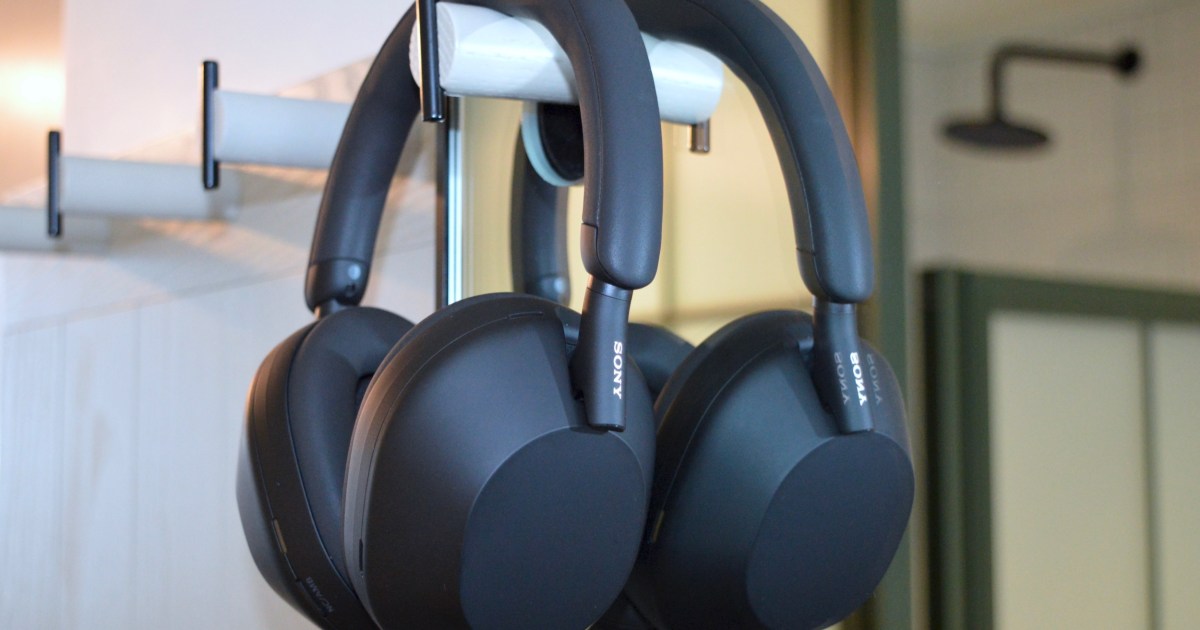 Sony's SRH-S1 was demoed at CES 2025.
Luke Larsen / Digital Trends
Sony's SRH-S1 was demoed at CES 2025.
Luke Larsen / Digital Trends
Sony is one of the biggest names in VR gaming with the popular PlayStation VR2. Now it’s launching a high-end XR headset with specifications that rival the Apple Vision Pro. To be clear, this isn’t the Sony XYN headset powered by Google’s new Android XR, and it won’t connect to a PlayStation 5. It’s aimed at enterprise customers that design products, and it costs even more than the ultra-premium Vision Pro.
Priced at $4,750, the Sony SRH-S1 is a powerful system with integrated hardware and software, a flip-up visor, and unique controllers optimized for manipulating virtual 3D objects. Being able to lift the visor for face-to-face conversations is convenient. The halo strap design also removes all facial pressure. A ring on one finger lets you grasp items, and a 3D stylus that looks like something from a sci-fi movie allows precise adjustments.
 Luke Larsen / Digital Trends
Luke Larsen / Digital TrendsMany specifications match the Vision Pro. It features 4K-per-eye microOLED panels and full-color passthrough so you can see your surroundings without removing the headset. It also has head-, hand-, and eye-tracking for intuitive control. It can be used as a standalone device or connected to a computer for more performance. That makes it one of the best VR headsets in terms of display and sensor quality.
There are plenty of Apple Vision Pro competitors arriving soon, and we’ve known about this Sony headset since last year. What we didn’t know were pricing and availability. The Sony SRH-S1 will be available starting January 23, 2025, from Siemens, who develops the integrated NX Immersive Designer CAD software. Shipping is expected to start in February.
 A person wears Sony’s XR headset over glasses. Sony
A person wears Sony’s XR headset over glasses. SonyWhile the Sony SRH-S1 is clearly aimed at enterprise, 2025 will be a big year for XR headsets that might catch your eye for immersive gaming, watching room-filling movies, and general computing while enjoying the peace and beauty of some exotic landscape.

Alan Truly is a Writer at Digital Trends, covering computers, laptops, hardware, software, and accessories that stand out as…
The Vision Pro still has a chance at success

There's no doubt that the Vision Pro hasn't exactly been a bestseller. A new report from market analysts indicates that fewer than 500,000 Vision Pro headsets will be sold by the end of the year.
However, the report also offers some good news for the future of the platform. According to Bloomberg, citing data from market analyst IDC, Apple is planning a cheaper version of the Vision Pro in 2025, and that could be the company's ticket to a much more popular device, predicting that it could double the sales of the Vision Pro next year.
Read more
How Apple plans to save the Vision Pro

It’s no secret that Apple’s Vision Pro headset is the best advanced headset on the market, with powerful specs and an immersive experience that no rival can truly match. It’s also no secret that Apple has struggled to sell its device, given its $3,499 price tag puts it way out of reach of most consumers. Apple reportedly has a plan to turn things around, though -- yet it might not involve a Vision Pro headset at all.
According to the latest Power On newsletter from Bloomberg reporter Mark Gurman, Apple plans to launch a cheaper Vision Pro in late 2025 at the earliest, followed by a second-generation mainstream Vision Pro around late 2026. After that is a set of much-discussed augmented reality (AR) glasses, although Gurman believes these are still many years away.
Read more
Apple’s cheaper Vision Pro may come with one big drawback

One of the major issues with Apple’s Vision Pro is its price tag. Many folks aren’t willing or able to drop $3,499 on a device they’re not even sure they’re going to use regularly, while others feel more inclined to see if the tech company might follow through with a more affordable version.
Mark Gurman, a high-profile and generally reliable Apple tipster, wrote in his weekly Power On newsletter on Sunday that the Vision Pro team tasked with building a cheaper Vision Pro is struggling to reduce costs without ruining the experience of a cheaper mixed-reality headset, which Gurman suggests may launch at the end of 2025 at the earliest.
Read more
![Qi2 is adding support for a moving coil, and it’s super cool [Video]](https://i0.wp.com/9to5google.com/wp-content/uploads/sites/4/2025/01/qi2-moving-coil-2_7cd8de.jpg?resize=1200%2C628&quality=82&strip=all&ssl=1)


















 English (US) ·
English (US) ·